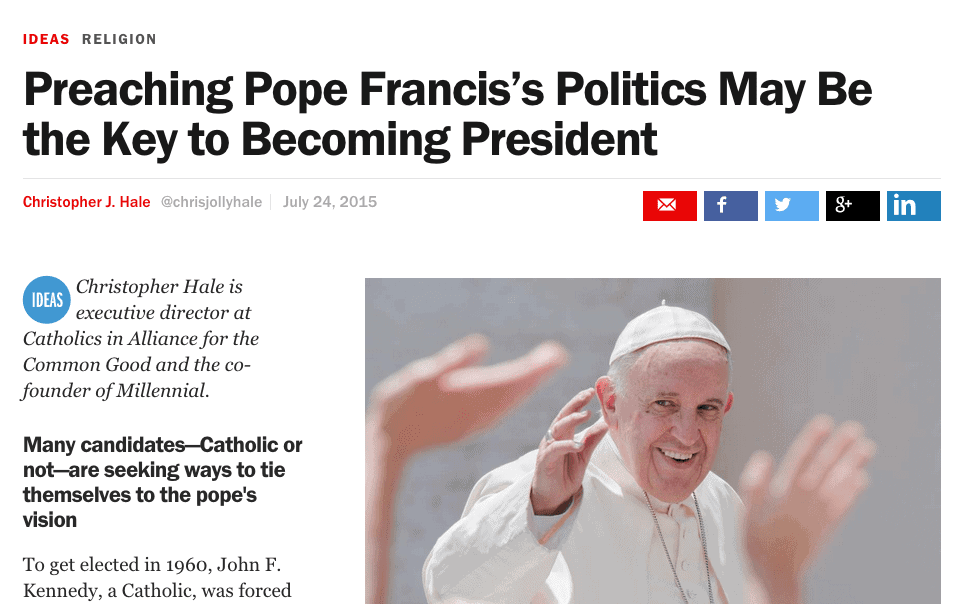
Editor's note: Commentaries are intended to express the richness and variety of informed and responsible Adventist opinion on current issues. They do not necessarily convey the viewpoint of the Adventist Review editorial team or the General Conference.
The U.S. political scene is interesting to say the least.
Bigger-than-life personalities, mud-throwing, scandals, gaffes — there’s never a dull moment. And of course the whole process is permeated with more religion than almost any nation on Earth.
For all the talk about the secularization of the United States, it is still one of the most overtly Christian nations on Earth. (I’m talking profession, not behavior.) Professed atheists still struggle to get any traction on the political campaign trail. Last fall, an openly atheist candidate ran for Congress for the first time in U.S. history. One congressman (Pete Stark) admitted to being an atheist after he took office; he lost his 2012 re-election bid. Congressman Barney Frank announced he was gay back in 1987, but he waited until he left office to admit to being an infidel.
The so-called Moral Majority may not be the powerful lobby it once was, but Christianity continues to drive and shape public discussion and political debate in powerful ways, even though the U.S. Constitution is quite clear that “no religious test shall ever be required as a qualification to any public office.”
The presumption of Christianity has obliged U.S. President Barack Obama to affirm his Christianity on more than one occasion. The same has been true for other presidents and presidential candidates.
Now 2016 presidential candidate Donald Trump appears to be positioning himself as a Christian candidate. Back in May, he announced that he would be “the greatest representative of the Christians they’ve had in a long time.” He was referring to the plight of Syrian Christians, but his statement placed him on many evangelical voters’ radar.
Trump, who identifies himself as a Presbyterian, also felt compelled to defend his Christianity when recently asked if he had ever asked God for forgiveness. His answer suggested a tragic lack of gospel understanding, but it was refreshingly honest — and it wasn’t much different than many peoples’ understanding of the gospel.
What was so refreshingly honest about it? Trump didn’t pretend to be a “born-again” believer (in the sense that most U.S. evangelicals would understand the term) in order to win popularity. He could have started feeding the cameras what most Christians would want to hear, but he didn’t. And the fact that he is openly friendly to Christianity seems, to some believers, to be good enough to crown him as a solid choice.
But Trump is not the only surprising religious influence in the coming race. A headline in the current issue of Time Magazine caught my attention: “Preaching Pope Francis’s Politics May Be the Key to Becoming President.” The article wasn’t entirely objective. It was actually a news commentary written by the executive director for Catholics in Alliance for the Common Good.
It was surprising nonetheless. Atheists are not the only ones who have struggled to gain traction in high-profile elections. Catholics have also struggled with acceptance over the years. As the article points out, back in 1960, John F. Kennedy had to assure the U.S. people that he wouldn’t be taking orders from the pope in order to get elected.
If there was widespread suspicion about the Roman Catholic Church’s influence on U.S. politics in the past, it seems to be all but over. On the list of current high-profile Catholic officeholders: the U.S. vice president, two-thirds of the U.S. Supreme Court justices, and the speaker of the U.S. House.
Your great-grandparents would have been surprised. The wall of separation between church and state, enshrined in the Constitution, was erected to preserve religious liberty and keep the hands of the church off of anybody who didn’t want the church touching them. It was a clear break with the power the Catholic Church had wielded for centuries in Europe. The constitutional separation wouldn’t preclude Catholic candidates per se, but the desire to prevent the Catholic Church from gaining a political foothold in the United States was so powerful that the motives and loyalty of Catholic candidates were often doubted.
Fast-forward to the 2016 presidential race and the bishop of Rome has, ostensibly, become one of the most popular spokespersons in U.S. — and global — politics. Of course, becoming more popular than your average political candidate these days isn’t all that impressive a feat, especially if you’re not a political candidate, considering voter fatigue, immensely unpopular governments, and the way that U.S. politics has generally deteriorated over time. As opposed to many politicians, the pope’s take-charge attitude and moral leadership seem refreshing to large numbers of people. He has become a powerful moral voice after a decades-long moral drought.
Pope Francis is scratching where many people are itching. He is a man of the disillusioned and the disenfranchised. He is challenging the global machinery of corporations and governments, and his audience is building. People disappointed with the world and its long string of political promise-breakers look to him as their next great hope. Upon his election in 2013, Time Magazine immediately crowned him Person of the Year. Christianity Today called him, “our Francis, too.” His popular influence is hard to overestimate.
In September, Pope Francis will be addressing Congress, another first for U.S. government. In the words of USA Today, “No pope or religious leader who serves as a head of state has addressed Congress, according to the U.S. House Historian’s Office.” Why? It’s that church and state thing.
For students of U.S. government and history, the pope’s influence is a surprising development. To students of Bible prophecy — well, they’ve been expecting things to begin trending this way for a long, long time.